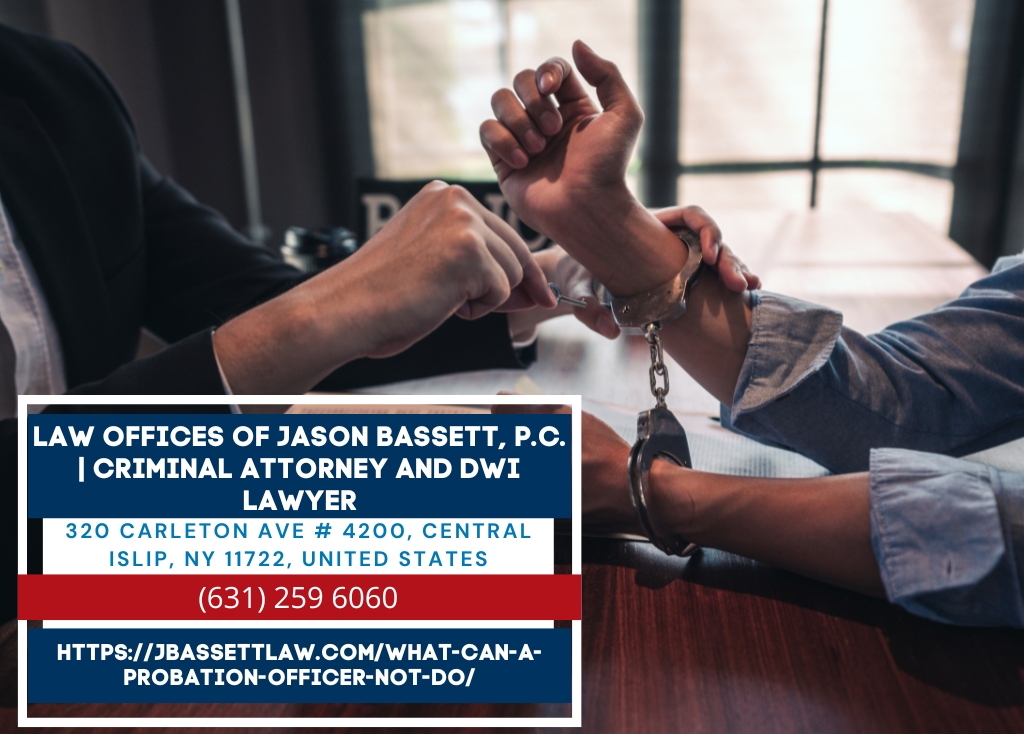Long Island criminal lawyer Jason Bassett (https://jbassettlaw.com/what-can-a-probation-officer-not-do/) of the Law Offices of Jason Bassett, P.C., has addressed the critical limitations placed on probation officers in New York. Probation officers play a pivotal role in ensuring that individuals under probation comply with court-ordered conditions. However, their authority is not unlimited. There are defined boundaries that probation officers must adhere to, safeguarding the rights and privacy of probationers. Jason Bassett provides clarity on these limitations, emphasizing their importance for maintaining fairness and accountability in the justice system.
According to Long Island criminal lawyer Jason Bassett, probation officers cannot interfere with aspects of a probationer’s life that are unrelated to probation compliance. For example, while they may access certain information like employment or residence details necessary to monitor compliance, they are not permitted to delve into personal financial records, medical history, or other sensitive information without legal cause. This ensures that probationers’ privacy rights are protected and that probation supervision remains within lawful boundaries.
Long Island criminal lawyer Jason Bassett highlights that probation officers also cannot impose restrictions on a probationer’s employment choices unless those restrictions are explicitly stated in court orders. For instance, a probationer may be barred from certain types of work connected to past offenses, but a probation officer cannot impose additional limitations or dictate specific job roles. This principle allows probationers to pursue careers that align with their skills and interests, provided they comply with court-imposed guidelines.
Family matters are another area where restrictions apply. Probation officers may assess whether a probationer’s living situation supports compliance with court orders, but they cannot dictate custody arrangements or influence legal disputes involving children. These issues are outside the scope of probation supervision and are handled separately by family courts. This separation ensures that probationers retain autonomy over their personal and family lives unless court-ordered probation conditions directly pertain to these areas.
In enforcing probation conditions, probation officers are prohibited from conducting unlawful searches or seizures. Any search must be based on reasonable suspicion and sanctioned by the court. Random searches or unauthorized entries into a probationer’s home or workplace violate Fourth Amendment protections. Probation officers are also limited in the use of surveillance techniques and cannot engage in constant electronic monitoring or excessive visits without cause. Monitoring methods must be proportionate and aligned with probationary terms, ensuring a balance between oversight and personal freedom.
Probation officers cannot independently modify or add conditions to those established by the court. For example, they may not restrict a probationer’s housing choices beyond what is stipulated in the probation terms. Decisions about where a probationer may live must be based on court orders, not the discretion of a probation officer. Similarly, probation officers cannot impose restrictions on personal relationships unless specific individuals or groups are named in the court-ordered conditions. These safeguards ensure that probation supervision is not arbitrary and respects the legal framework established by the court.
All financial obligations imposed on probationers, such as fines or restitution, must be ordered by the court. Probation officers cannot demand additional payments or financial contributions beyond these orders. This ensures transparency in financial requirements and protects probationers from unauthorized demands. Any attempts to impose extra financial penalties or conditions would be considered an overreach and are subject to legal challenge.
Jason Bassett emphasizes that probationers have legal protections against misconduct by probation officers. Probationers have the right to report unethical behavior, appeal decisions, and seek legal representation if they believe a probation officer has acted outside their authority. Accountability measures exist to address any overreach, ensuring that probation supervision is conducted fairly and within the bounds of the law.
Probation officers who violate these boundaries may face serious repercussions, including disciplinary action or legal consequences. Misconduct undermines the integrity of the probation system and can result in sanctions, including termination. Ensuring accountability helps maintain trust in the justice system and reinforces the ethical standards expected of probation officers.
For those navigating probation, understanding these limitations can provide clarity and confidence in their rights. Probation officers play a critical role in enforcing compliance and supporting rehabilitation, but their actions must remain lawful and respectful of probationers’ personal freedoms.
About Law Offices of Jason Bassett, P.C.:
The Law Offices of Jason Bassett, P.C., is a Long Island-based law firm dedicated to providing legal representation in criminal defense matters. The firm is committed to protecting the rights of individuals facing criminal charges and navigating complex legal situations. Through a detailed understanding of the law and a focus on achieving fair outcomes, the Law Offices of Jason Bassett, P.C., offers clients comprehensive guidance and advocacy.
Embeds:
Youtube Video: https://www.youtube.com/watch?v=yMGvF10giX0
GMB: https://www.google.com/maps?cid=695024758410642184
Email and website
Email: bassettlaw@live.com
Website: https://jbassettlaw.com/
Media Contact
Company Name: Law Offices of Jason Bassett, P.C.
Contact Person: Jason Bassett
Email: Send Email
Phone: (631) 259-6060
Address:320 Carleton Ave Suite 4200
City: Central Islip
State: New York 11722
Country: United States
Website: https://jbassettlaw.com/

